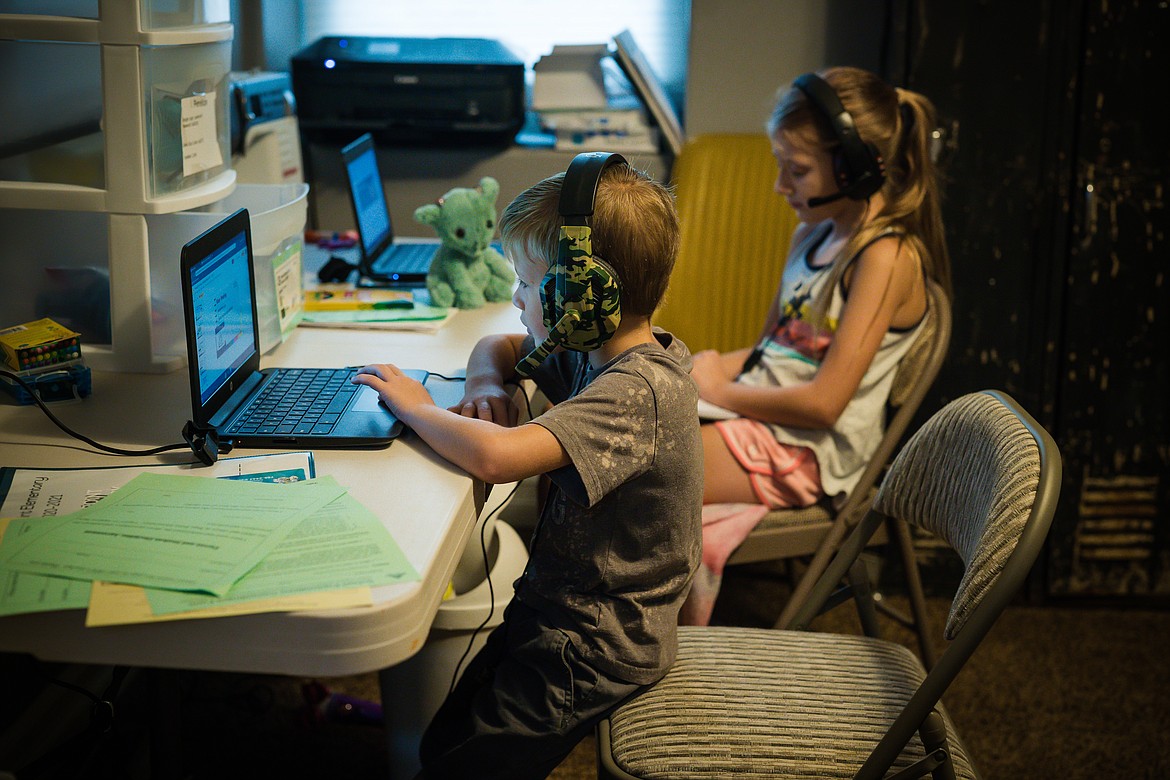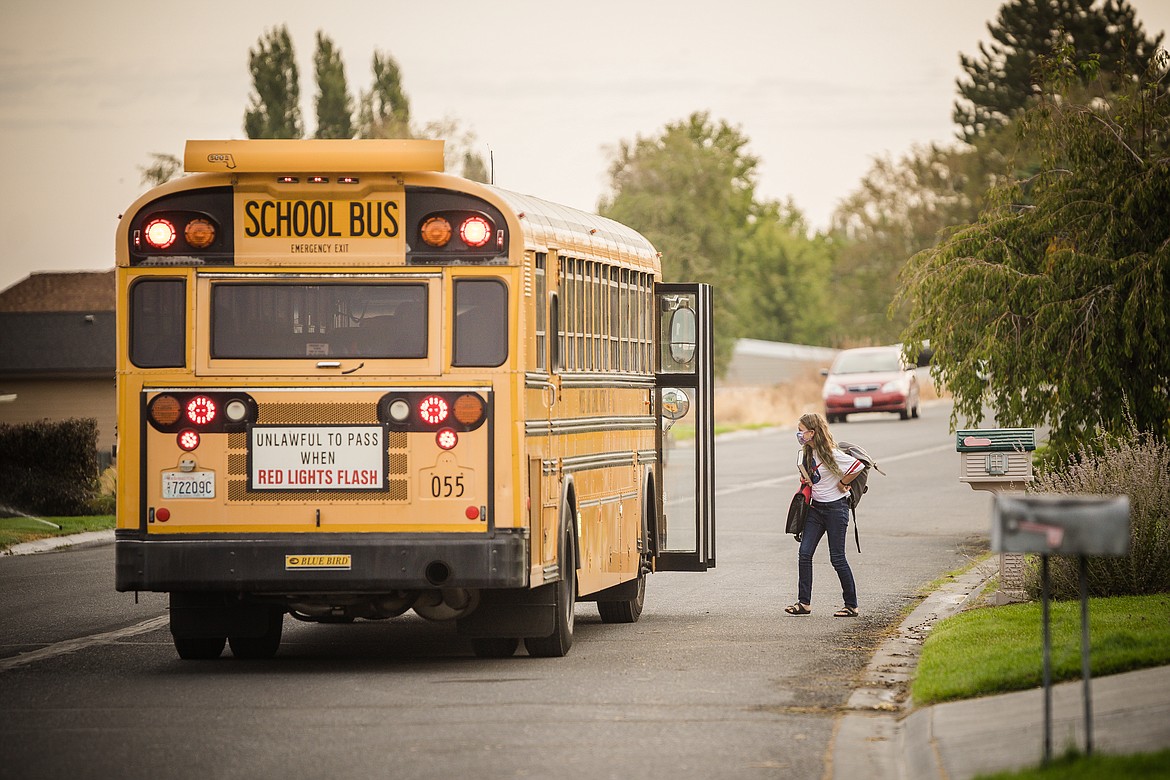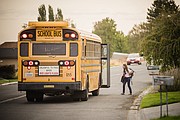School year has been a breeze for some, a whirlwind for others
EMRY DINMAN | Hagadone News Network | UPDATED 5 years, 4 months AGO
MOSES LAKE — The new school year, complete with pandemic restrictions, has been a mixed bag for families, with households having very different experiences, depending on their students’ needs and skill sets.
That’s readily apparent in the home of Korbi Ashton, who has four students enrolled in Moses Lake School District: two in elementary school, one a middle schooler and one a freshman in high school. Though all but her high schooler have been receiving hybrid learning and are in classes two days a week, each of her four kids has had very different experiences with learning.
“My middle schooler, she’s studious,” Ashton said. “It doesn’t matter, you could teach her in a tree, on the computer, in a boat in the middle of the lake, and she’d be just fine.”
Meanwhile, Ashton’s two elementary schoolers have had very different experiences from one another, she said. Her 7-year-old son has been able to make use of the semi-online format of his classes, waking up before the rest of his house and finishing his school work before the day has even begun, she said.
“His teachers say they have to post their assignments early because they know he gets it done really fast,” she said.
But for her 8-year-old daughter, who has had difficulties connecting with the coursework or working by herself, online classes have been a daily struggle.
“She ends most of her days crying and spends a majority of her time just really upset,” Ashton said. “It’s not that the workload is too much, but it just takes her so long to get through it, because of the way that she’s trying to learn.”
Despite their best efforts, it’s been a frustrating experience for her daughter’s teachers too, Ashton said, because they can’t reach out and help her whenever a link isn’t working properly or the house’s internet connection is too slow, or when she just isn’t understanding the material on her screen.
“Her brain just doesn’t work like that,” Ashton said. “I fear for the other kids who don’t learn like that and don’t have a support system at home.”
Other families have similarly seen their children have radically different experiences with the same schools and same learning styles. Tiffany and Noah Zemke’s two middle-school-age children are enrolled in all-online classes and say their children have little oversight or accountability from the schools and need to be self-directed.
That’s gone well so far for their daughter in seventh grade, who on week three of classes they say is already nearing the end of her semester’s coursework – a good sign, though they said the schools have essentially left it to them to fill her time once she’s completed all of the work there is to do. While their eighth-grader son has been more successful this school year than he was with fall’s sudden turn to online classes, they said they’ve been heavily involved in making sure he understands and completes his coursework.
The Zemkes both work from home and have been able to engage their kids with their coursework but said they didn’t believe that online-only learning would be feasible if they weren’t at home.
“They would be on their own, and I think they would really struggle with that if they didn’t have somebody around,” Tiffany said.
While Ashton would have preferred to have her students learning in-person full-time, she said her family had decided to pursue a hybrid model so her kids would have some face-to-face time with teachers, but limited seats for full-time in-person education could be saved for households with only one parent or two working parents.
Her oldest son, who started high school this year as a freshman, would clearly prefer to be in a classroom with his friends and peer group, Ashton said. While the district continues to consider ways to safely introduce high schoolers back into classrooms, the school year has begun without any option for in-person learning due to concerns that older children may be at higher risk from the coronavirus.
On top of social needs that aren’t being met, the online-only format has complicated a number of her oldest son’s classes, particularly electives that can be difficult to convey without hands-on learning, Ashton said. She’s quick to add, however, that she believes the difficulties have been through no fault of the instructors.
In some cases, those educational barriers have been incredibly difficult for students. Moses Lake resident Erika Ritchie also has a son who just became a freshman this year after a struggling to make it through online courses at the end of eighth grade. Once a straight-A student at Moses Lake Christian Academy, the recent switch to public schools had been rough, but he had begun to get his feet under him, Ritchie said.
Then the pandemic hit, and Ritchie’s son was forced to take classes online. After all but flunking his last school year, only to learn in April that poor grades weren’t going to cause a student to be held back, Ritchie had originally opted for full in-person education this school year. When she learned that would no longer be an option, it was a big blow to her family.
“He does not learn well online, so we are having to sit down and do the work with him just to get him through the class,” Ritchie said. “His dad and I both work in an office, so it has to be done after work.”
On top of trying to take on guiding her son through the school year, Ritchie has also noticed that he has been struggling with depression and anxiety and has difficulty doing things on camera for his classes that he could handle in person – though as a 14-year-old, he doesn’t communicate that to her directly, she added. Though her son would normally find a social outlet through football and basketball, those avenues are not available for him.
But while she and many other families have been scrambling to find ways to be more available for their children, aiding them through the school year where they’ve had difficulties, Ritchie said she worries most about the kids without support systems at home. Doing work in therapy as part of her master’s program, she said she has seen many kids whose only role models or supportive adults were found in school, whether through a teacher or coach.
“And now that they don’t have that, they’re starting to struggle not just with depression but substance abuse, because they don’t have that one adult that can help them,” Ritchie said.
Emry Dinman can be reached via email at [email protected].
ARTICLES BY EMRY DINMAN
Mattawa Police Department to use new emergency alert system
The Mattawa Police Department will be using a new emergency alert system to better and more quickly inform residents of fires, traffic hazards and other incidents.
Royal City seeking new councilmember
The Royal City Council is going to enter the new year short one councilmember, and is currently soliciting applications from individuals interested in filling the position.
Mattawa looks to the legislature to make filling agency easier
To combat the difficulties Mattawa has had filling its Civil Service Commission, the town is deploying municipal lawyer Katherine Kenison to lobby the legislature to simplify the process during the upcoming legislative session.



